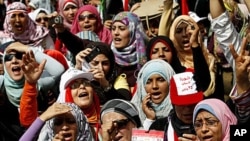In his speech to the U.N. General Assembly, President Barack Obama described the past year as one of "extraordinary transformation," particularly in the Middle East:
"The humiliating grip of corruption and tyranny is being pried open. Dictators are on notice ... The youth are delivering a powerful rebuke to dictatorship, and rejecting the lie that some races, some peoples, some religions, some ethnicities do not desire democracy."
The courageous demands of the people of the region for freedom and dignity have borne fruit: the Qadhafi regime is over; Ben Ali has left Tunisia, and Mubarak is no longer in power in Egypt. Regarding Yemen, President Obama said, "We must work with Yemen's neighbors and our partners around the world to seek a path that allows for a peaceful transition of power from President [Ali Abdullah] Saleh, and movement to free and fair elections as soon as possible."
In Bahrain, "steps have been taken toward reform and accountability. . . but more is required," said Mr. Obama. The U.S. continues to urge all parties, across the political spectrum, to pursue meaningful dialogue that brings peaceful change.
President Obama noted, however, that some regimes in the region are determined to silence all calls for freedom:
In Iran, we've seen a government that refuses to recognize the rights of its own people. As we meet here today, men and women and children are being tortured, detained and murdered by the Syrian regime. . . . The Syrian people have shown dignity and courage in their pursuit of justice – protesting peacefully, standing silently in the streets, dying for the same values that this institution is supposed to stand for. And the question for us is clear: Will we stand with the Syrian people, or with their oppressors?"
President Obama called on the Security Council to impose sanctions on the Syrian regime, and stand with the people of Syria in their struggle.
As the world changes at a breathtaking pace, the international community must remember "the moral nature of man's aspirations," said Mr. Obama. "The measure of our success must be whether people can live in sustained freedom, dignity and security. And the United Nations and its member states must do their part to support those basic aspirations."
Obama At UN On Mideast Transformation

In his speech to the U.N. General Assembly, President Barack Obama described the past year as one of "extraordinary transformation," particularly in the Middle East.



